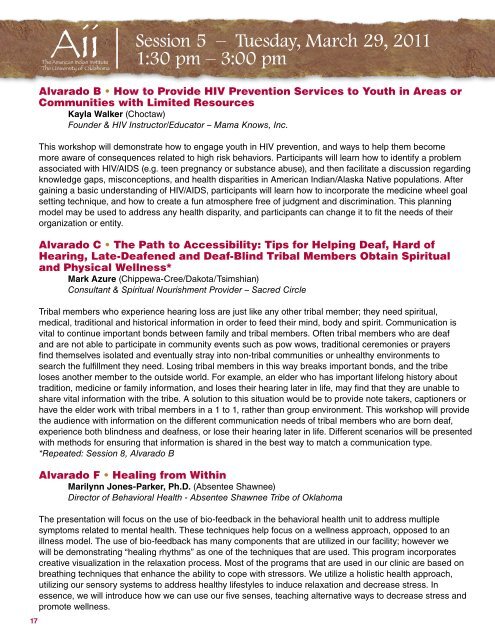10th Native Women & Men's Wellness .pdf - American Indian Institute
10th Native Women & Men's Wellness .pdf - American Indian Institute
10th Native Women & Men's Wellness .pdf - American Indian Institute
You also want an ePaper? Increase the reach of your titles
YUMPU automatically turns print PDFs into web optimized ePapers that Google loves.
17<br />
Session 5 – Tuesday, March 29, 2011<br />
1:30 pm – 3:00 pm<br />
Alvarado B • How to Provide HIV Prevention Services to Youth in Areas or<br />
Communities with Limited Resources<br />
Kayla Walker (Choctaw)<br />
Founder & HIV Instructor/Educator – Mama Knows, Inc.<br />
This workshop will demonstrate how to engage youth in HIV prevention, and ways to help them become<br />
more aware of consequences related to high risk behaviors. Participants will learn how to identify a problem<br />
associated with HIV/AIDS (e.g. teen pregnancy or substance abuse), and then facilitate a discussion regarding<br />
knowledge gaps, misconceptions, and health disparities in <strong>American</strong> <strong>Indian</strong>/Alaska <strong>Native</strong> populations. After<br />
gaining a basic understanding of HIV/AIDS, participants will learn how to incorporate the medicine wheel goal<br />
setting technique, and how to create a fun atmosphere free of judgment and discrimination. This planning<br />
model may be used to address any health disparity, and participants can change it to fit the needs of their<br />
organization or entity.<br />
Alvarado C • The Path to Accessibility: Tips for Helping Deaf, Hard of<br />
Hearing, Late-Deafened and Deaf-Blind Tribal Members Obtain Spiritual<br />
and Physical <strong>Wellness</strong>*<br />
Mark Azure (Chippewa-Cree/Dakota/Tsimshian)<br />
Consultant & Spiritual Nourishment Provider – Sacred Circle<br />
Tribal members who experience hearing loss are just like any other tribal member; they need spiritual,<br />
medical, traditional and historical information in order to feed their mind, body and spirit. Communication is<br />
vital to continue important bonds between family and tribal members. Often tribal members who are deaf<br />
and are not able to participate in community events such as pow wows, traditional ceremonies or prayers<br />
find themselves isolated and eventually stray into non-tribal communities or unhealthy environments to<br />
search the fulfillment they need. Losing tribal members in this way breaks important bonds, and the tribe<br />
loses another member to the outside world. For example, an elder who has important lifelong history about<br />
tradition, medicine or family information, and loses their hearing later in life, may find that they are unable to<br />
share vital information with the tribe. A solution to this situation would be to provide note takers, captioners or<br />
have the elder work with tribal members in a 1 to 1, rather than group environment. This workshop will provide<br />
the audience with information on the different communication needs of tribal members who are born deaf,<br />
experience both blindness and deafness, or lose their hearing later in life. Different scenarios will be presented<br />
with methods for ensuring that information is shared in the best way to match a communication type.<br />
*Repeated: Session 8, Alvarado B<br />
Alvarado F • Healing from Within<br />
Marilynn Jones-Parker, Ph.D. (Absentee Shawnee)<br />
Director of Behavioral Health - Absentee Shawnee Tribe of Oklahoma<br />
The presentation will focus on the use of bio-feedback in the behavioral health unit to address multiple<br />
symptoms related to mental health. These techniques help focus on a wellness approach, opposed to an<br />
illness model. The use of bio-feedback has many components that are utilized in our facility; however we<br />
will be demonstrating “healing rhythms” as one of the techniques that are used. This program incorporates<br />
creative visualization in the relaxation process. Most of the programs that are used in our clinic are based on<br />
breathing techniques that enhance the ability to cope with stressors. We utilize a holistic health approach,<br />
utilizing our sensory systems to address healthy lifestyles to induce relaxation and decrease stress. In<br />
essence, we will introduce how we can use our five senses, teaching alternative ways to decrease stress and<br />
promote wellness.


